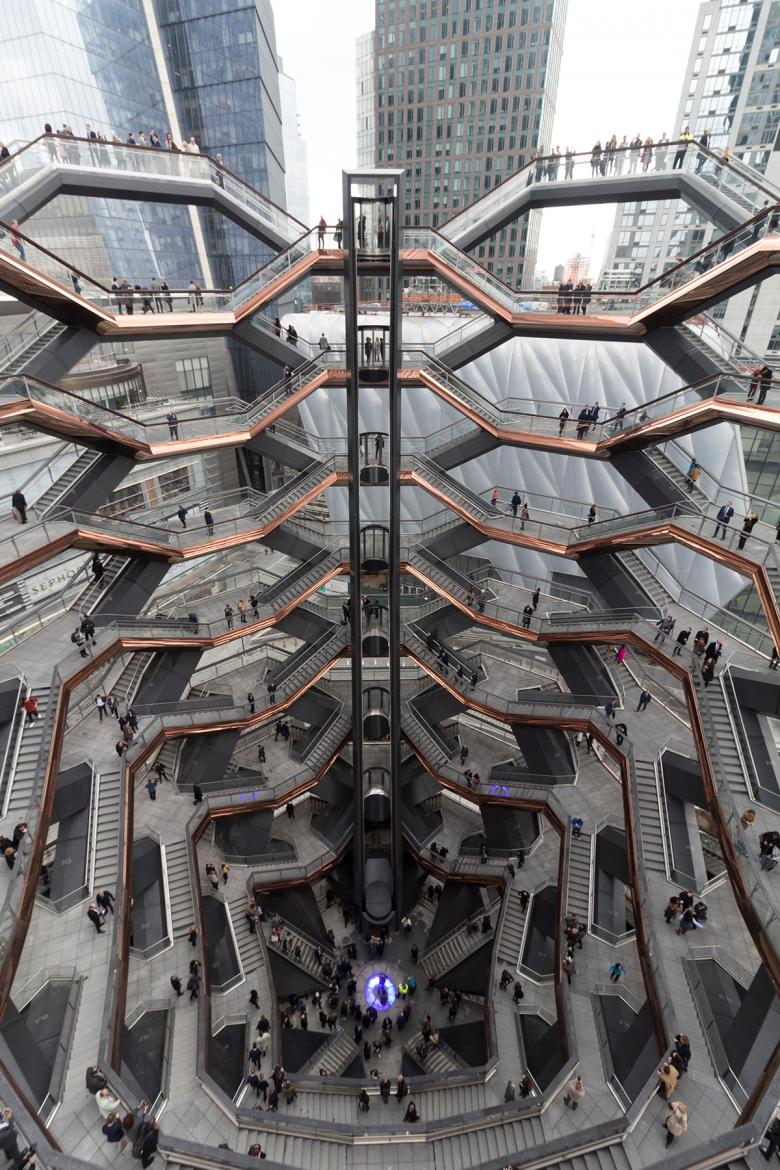Third Suicide Shutters Vessel
The Vessel, the 150-foot (45m) tall climbable sculpture designed by Heatherwick Studio for the Hudson Yards development on Manhattan's West Side, has closed indefinitely after a third suicide in less than one year.
The first suicide happened on February 1, 2020, when a 19-year-old college student jumped from the sixth level of the $150 million sculpture that consists of 150 flights of stairs connecting 80 landings. We reported on that unfortunate news last year, but we missed reports of the second suicide, which happened just last month, when a 24-year-old woman from Brooklyn ended her life by jumping from one of the landings. The third suicide happened a couple days ago, on January 12, when a 21-year-old man jumped to his death. While the first two suicides did not appear to affect access to the climbable sculpture, the latest one has led the developer, Related Companies, to close it indefinitely and "[consult] with suicide-prevention experts, including psychiatrists, about how to limit the potential for more suicides," according to the New York Times.
Heatherwick Studio's design features guardrails that are roughly chest height — tall enough to keep an accidental trip from becoming fatal but not tall enough to deter people from climbing over them. New York City building code requires considerably taller barriers at bridges and other overlooks, such as playgrounds on rooftops and observatories. An examples of the latter is the recently opened Edge sky deck that protrudes from the 100th floor of neighboring 30 Hudson Yards; it features glass barriers above head height. Another design just steps away from the Vessel sets a precedent in the other direction: the High Line elevated park has lower, roughly waist-high barriers, enabled by positioning planters between the walkways and the railings. Yet the High Line is only three stories above the street, while the top of the Vessel is the equivalent of a 15-story building — tall enough to look over the adjacent Shed building toward the High Line.
Physical fixes for suicides exist, most notably at the Bobst Library at New York University (NYU), a few miles from Hudson Yards. As we discussed in our coverage of the first suicide at the Vessel, and was mentioned in a much-cited 2016 article by Audrey Wachs that foresaw the suicides, the atrium of the 1970s library designed by Philip Johnson and Richard Foster became the setting of suicides in 2003 and 2009. Those prompted NYU to first install plastic barriers and then eventually put in permanent, full-height screens designed by architect Joel Sanders. But retrofitting the Vessel with taller or full-height barriers would require their installation on both sides of the stairs and landings, basically shrouding the architectural sculpture in a safety layer.
Do other alternatives exist? A 2019 press release on the dissertation of Charlotta Thodelius at Chalmer University of Technology in Sweden asserts that "suicide among younger people is often so spontaneous that it can be prevented if they do not encounter a potentially dangerous place outdoors." The Vessel, as Wachs' reporting foreshadowed, certainly fits that description. And given that the three people committing suicide at the Vessel were between the ages of 19 and 24, Thodelius's statements on the importance of location in suicidal situations are telling, such as young people searching out desolate but easily accessible places. Although the Vessel required timed tickets, even before the pandemic, it was freely accessible to anyone who had an internet connection and signed up online. Two of the three deaths occurred during quarantine, when the Vessel was relatively empty, and all of them were during cold months, when the outdoor sculpture would also be less traversed. It's certainly possible that a heavily populated Vessel is one of the best deterrents to suicide: the proverbial "eyes on the street" raised fifteen floors up. But without a constant stream of tourists, as on warm and dry days outside of lockdown, such an approach would mean a constant presence of security guards or other hired personnel peppered across the Vessel.
Any fix on the part of Related Companies and Heatherwick Studio is obviously to be determined, yet eagerly awaited, but it should noted that the end of this month was the court-mandated deadline for the sculpture to increase accessibility. A ruling in late 2019 required the developer to install "a one-of-a-kind platform lift mechanism" that will allow people in wheelchairs to access the whole top level of the Vessel, not just a few landings, as was the case with the operation of its single elevator. There's no indication of a fix being implemented, though the pandemic may have necessitated an extension on the deadline. But now, with the events last month and this week, the developer and designer face a more considerable challenge: to make the Vessel as safe as it is striking.
